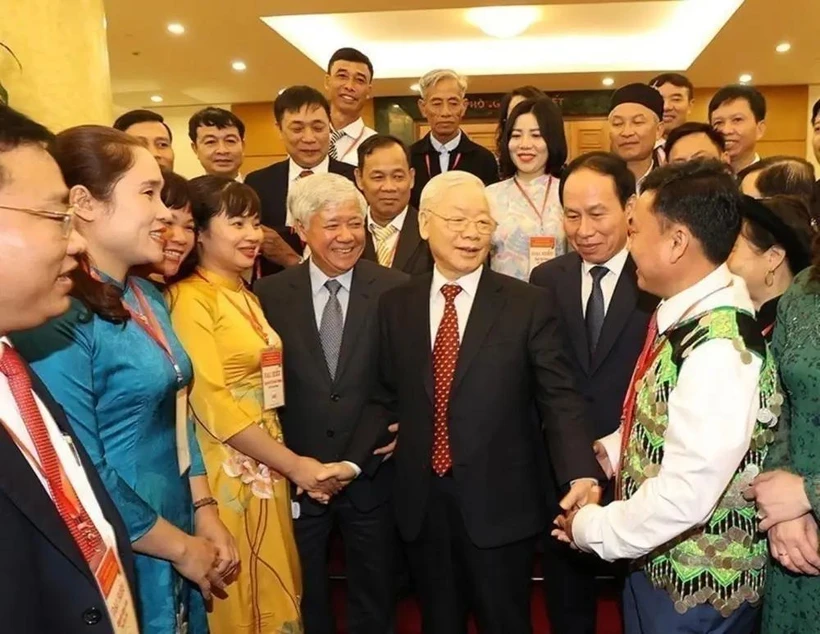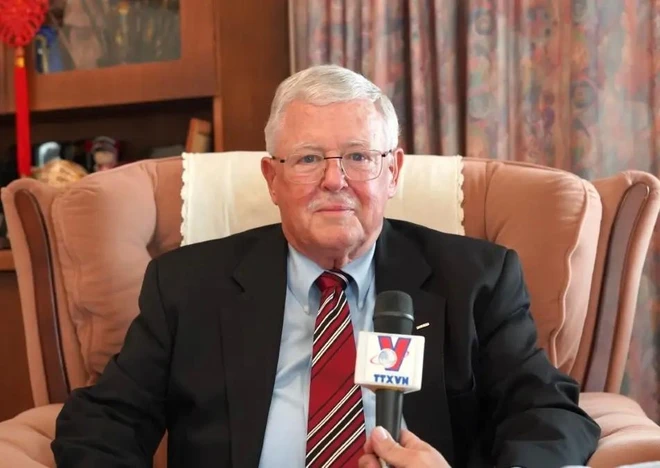 Party General Secretary Nguyen Phu Trong meets delegates to the National Cultural Conference implementing the resolution of the 13th National Party Congress on November 24, 2021. (Photo: VNA)
Party General Secretary Nguyen Phu Trong meets delegates to the National Cultural Conference implementing the resolution of the 13th National Party Congress on November 24, 2021. (Photo: VNA)
Professor Carl Thayer from the Australian Defence Force Academy, the University of New South Wales, has emphasised that the conferment of the Gold Star Order, the highest decoration in Vietnam, on Party General Secretary Nguyen Phu Trong acknowledges his very special contributions to the country.
In an interview granted to the Vietnam News Agency (VNA), the professor noted major achievements the Party leader made, including his anti-corruption campaign, during which he declared “no off-limits zones and no exceptions”.
The drive has eliminated many corrupt officials and held a number of leaders accountable, even those at the highest positions, Thayer added, affirming with the Party chief’s “blazing furnace” campaign, Vietnam has made marked progress in the fight against corruption.
The campaign is just part of the General Secretary’s efforts in Party building and rectification in order to place individuals with talents and good ethics in the Party’s high-ranking posts, and resolutely dismiss those who no longer deserve public trust, the professor said, calling them strategic decisions.
Thayer said the General Secretary devoted his lifetime to Party building, and that he overhauled many Party regulations, particularly those on things that Party members should do and are not permitted to do, with an emphasis that Vietnam is a rule-of-law State under the leadership of the Communist Party of Vietnam (CPV).
 Professor Carl Thayer from the Australian Defence Force Academy, the University of New South Wales. (Photo: VNA)
Professor Carl Thayer from the Australian Defence Force Academy, the University of New South Wales. (Photo: VNA)
Regarding the top leader’s contributions to Vietnam’s foreign policy, the professor stressed that he established the legitimacy and reputation of the CPV and its leadership during meetings with foreign leaders.
General Secretary Trong had met with President Joe Biden of the US, President Vladimir Putin of Russia, President Xi Jinping of China and President Narendra Modi of India, and in joint statements issued after those meetings, the countries all expressed their respect for Vietnam’s political system, Thayer continued.
The professor also took note of the late leader’s noteworthy imprint on Vietnam's external policy with the phrase “bamboo diplomacy,” using the image of the Vietnamese bamboo tree, with strong roots and a sturdy but flexible trunks to describe Vietnam’s foreign policy of “more friends, fewer foes”.
General Secretary Trong remained steadfast in protecting socialism in Vietnam, as well as its independence and self-reliance, but he is also very practical in promoting national interests, Thayer said.
He held that Vietnam has made many important decisions in recent times, including strengthening and upgrading its relations with the Republic of Korea, the US, Japan and Australia to the highest level that is the comprehensive strategic partnership.
Asked about the Vietnam-Australia relationship, the professor said it has received the support from the two major parties in Australia, and highlighted contributions by the large number of Vietnamese in Australia to the bilateral ties./.
VNA